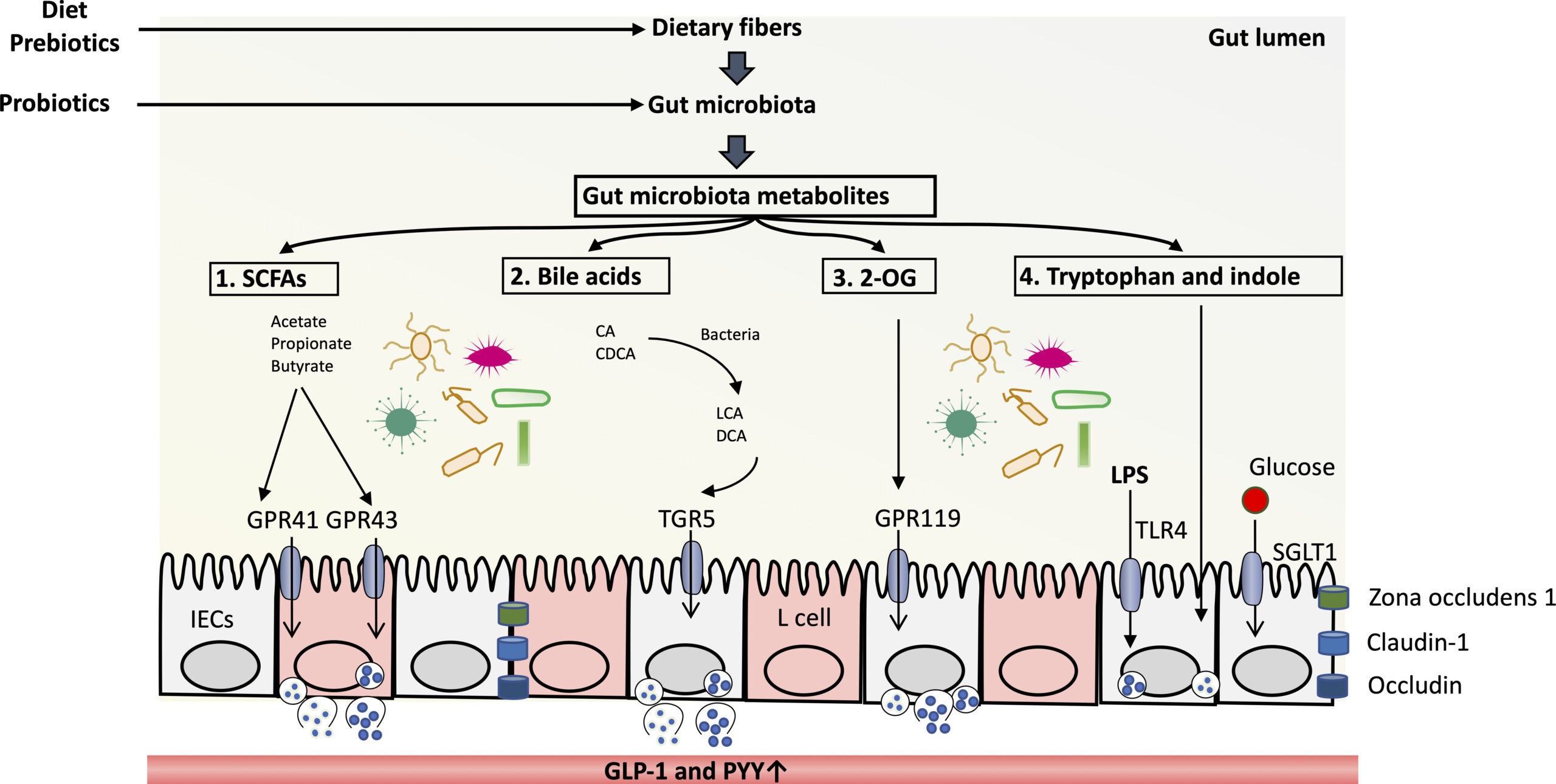💡 This scientific report investigates the intricate relationship between gut microbiota and glucagon-like peptide 1 (GLP-1) and its implications for metabolic health.
The research delves into specific mechanisms, such as the impact of gut microbiota metabolites on GLP-1 secretion, the effects of GLP-1 on gut microbiota composition, and how interventions like prebiotics, probiotics, antidiabetic drugs, and bariatric surgery modulate this crosstalk.
📍 Gut Microbiota Influence on GLP-1 Secretion:
a. Metabolites Stimulating GLP-1 Secretion:
i. Short-chain fatty acids (SCFAs) and secondary bile acids (BAs) are identified as key microbial metabolites influencing GLP-1 secretion.
ii. SCFAs, particularly acetate and propionate, activate GPR43 and GPR41 receptors on enteroendocrine L cells, leading to increased GLP-1 secretion.
iii. Secondary BAs exhibit dual regulatory effects on GLP-1 secretion through TGR5 and FXR receptors.
b. Prebiotics and Probiotics:
i. Prebiotics, such as oligofructose and resistant starch, show inconsistent effects on GLP-1 secretion in humans, while studies in mice demonstrate increased GLP-1 with enhanced butyrate-producing bacteria.
ii. Probiotic interventions, including 𝘓𝘢𝘤𝘵𝘰𝘣𝘢𝘤𝘪𝘭𝘭𝘶𝘴 𝘢𝘯𝘥 𝘈𝘯𝘢𝘦𝘳𝘰𝘣𝘶𝘵𝘺𝘳𝘪𝘤𝘶𝘮,
positively impact GLP-1 levels in metabolic syndrome and T2D mice.
📍 GLP-1 Effects on Gut Microbiota:
a. GLP-1 Analog Influence:
i. Liraglutide, a GLP-1 analog, modulates the gut microbiota structure, increasing diversity and abundance of specific bacteria, including 𝘈𝘬𝘬𝘦𝘳𝘮𝘢𝘯𝘴𝘪𝘢 𝘮𝘶𝘤𝘪𝘯𝘪𝘱𝘩𝘪𝘭𝘢.
ii. DPP-4 inhibitors, linagliptin and sitagliptin, affect microbiota composition, correcting dysbiosis in obese and T2D mice.
b. Inflammatory Response:
i. GLP-1’s anti-inflammatory action involves inhibiting cytokines and macrophage infiltration, contributing to improved intestinal health.
Gut Hormones’ Role in Gut Microbiota:
The report highlights the bidirectional communication between gut peptides (GLP-1, PYY) and gut microbiota, emphasizing their impact on appetite, satiety, and intestinal motility.
📍 Interventions and their Effects:
a. Antidiabetic Drugs:
i. Metformin and SGLT2 inhibitors influence gut microbiota composition and promote GLP-1 secretion in T2D patients and DIO mice.
ii. DPP-4 inhibitors, such as vildagliptin, correct dysbiosis in obese and T2D mice.
b. Bariatric Surgery:
i. RYGB and SG surgeries alter gut microbiota ecology, correlating with increased GLP-1 signaling.
ii. Changes in bile acid levels post-bariatric surgery may contribute to elevated GLP-1 secretion.
Link to the article : https://tinyurl.com/2j25rhud
